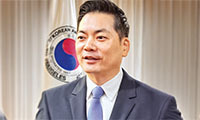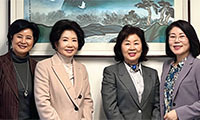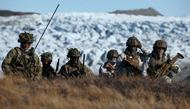
The world financial crisis is proving that the G-8, seen meeting in Japan in 2008, is far too limited in its representation.

SPENCER PLATT/GETTY IMAGES; YURI KOCHETKOV/EUROPEAN PRESSPHOTO AGENCY (BELOW)
ESSAYJAMES TRAUB
The bloodshed in Gaza underscores how challenging it will be for Barack Obama to realize visions of reshaped global governing structures, like the United Nations.
EVEN BEFORE ISRAEL launched attacks on Gaza last month, Barack Obama’s incoming national security team understood that the demands of dealing with the crisis of the moment could easily eclipse the hopes for a transformation in foreign affairs that Mr.Obama spoke of during the campaign.
The wars in Iraq and Afghanistan, instability in Pakistan and the threat of nuclear proliferation in Iran would have been more than enough to crowd out any thought of long-range planning. Now the Middle East is in flames again. And yet a wide range of foreign policy experts are urging the new president to look beyond the smoke and the bloodshed - indeed, to take advantage of a continuous sense of crisis - to reshape the world’s governing structures.
Those structures - the United Nations, the World Bank and the International Monetary Fund, among others - date from the end of World War II, when the victors enjoyed a monopoly on economic and political power, and the state system seemed impregnable. We no longer live in such a world. Vivid proof that we don’t came in November, when President Bush, no dreamer of multilateral dreams, convened the “G-20” to deal with the financial crisis.
Until then, the planet’s executive board had been known since it first assembled in 1975 as the Group of 7, or G-7 (G-8, when Russia attended). Robert Hormats, a former Treasury and State Department official present at that first meeting, notes that for a long time the Western powers“could manage the global economy among themselves.
”Now, he says,“it’s inconceivable.”
China is by far the United States’ biggest creditor; emerging nations like China, India, Brazil and Indonesia now account for most of the world’s economic growth. The G-20 will meet again in April. By the time the G-8 convenes in Rome two months later, it may be all but defunct; Italy, this year’s host, is considering whether to throw open the meeting to new members.
Reinvention is in the air. Last January, Prime Minister Gordon Brown of Britain delivered a major speech in New Delhi in which he observed that globalization had brought new powers - like India - to the fore; he called for a new “creation” moment that would include changes in the composition of the postwar institutions and new mechanisms to deal with climate change, poverty, energy and nuclear nonproliferation.
Many major diplomatic figures from both American political parties have been linked to such calls. Brent Scowcroft, former national security adviser to the first President Bush, says,“We ought to have institutions that reflect the world we live in.”It’s the new realism.
Indeed, the postwar institutions are full of yesterday’s great names. It’s not just Italy in the G-8. Switzerland, the Netherlands and Belgium all have seats on the I.M.F. board (where they also represent other nations); Singapore and South Africa do not. China does, but it has barely more votes than Canada.
Far more provocative to the developing world is the composition of the United Nations Security Council, whose roster of veto-bearing permanent members has not changed since inception; the West still holds three of the five permanent seats.
Mr.Obama, unlike his predecessor, views the United Nations as an essential instrument of American foreign policy, but he may find his initiatives blocked by third-world bitterness. United Nations experts said he would win himself enormous good will if he openly supported Security Council seats for the current aspirants: India, Brazil, Germany, Japan and perhaps South Africa.
I.M.F. reform will look like a walk in the park compared to the Security Council. The last time the United Nations made a serious run at expanding the council, in 2005, every candidate had its own sworn enemy. Some advocates have suggested that Washington focus first on limiting the use of the veto and only later on inducting new members. Even that, however, would require an enormous diplomatic effort.
What’s more, making an organization more representative does not necessarily make it more effective. The financial crisis has demonstrated the need for new global regulatory mechanisms. Still, what’s the alternative- The West wants China, Russia and the emerging economies to view themselves as responsible global players. That means giving them a stake in the system, and hoping that having stakes will make them better stakeholders.
The advocates of reinvention seem to have the merits on their side. But the central issue for an incoming administration is less,“Is it right?”than,“How much effort is it worth?”How important is it to create and reform these new structures, compared to crisis management?
Of course, the United Nations can wait, while peace in the Middle East can’t. But there is also another way of looking at the question: an administration that wants to work through institutions, as opposed to“coalitions of the willing,”will have to choose between reforming those institutions and watching them decline into irrelevance.
In other words, change is inevitable. The question, says David Rothkopf, a national security expert and consultant who is an apostle of reinvention, is:“Do we allow it to happen at its own pace, uncoordinated, incrementally, or do we see this as an opportunity and produce a new vision for an international system that advances U.S. interests in the same way that the post-World War II vision did for 60 years?”
스마터리빙
more [ 건강]
[ 건강]이제 혈관 건강도 챙기자!
[현대해운]우리 눈에 보이지 않기 때문에 혈관 건강을 챙기는 것은 결코 쉽지 않은데요. 여러분은 혈관 건강을 유지하기 위해 어떤 노력을 하시나요?
 [ 건강]
[ 건강]내 몸이 건강해지는 과일궁합
 [ 라이프]
[ 라이프]벌레야 물럿거라! 천연 해충제 만들기
 [ 건강]
[ 건강]혈압 낮추는데 좋은 식품
[현대해운]혈관 건강은 주로 노화가 진행되면서 지켜야 할 문제라고 인식되어 왔습니다. 최근 생활 패턴과 식생활의 변화로 혈관의 노화 진행이 빨라지고
사람·사람들
more많이 본 기사
- 트럼프 행정부, 미네소타서 “최대 규모” 이민단속…주정부 반발
- 정의선, 젠슨 황 회동…엔비디아·삼성·LG·퀄컴과 전방위 협력 행보 [CES 2026]
- 연방정부, 5개 주에 저소득층 아동 예산 보류… “사기 우려”
- 브라운대·MIT 총격범 “3년 계획…사과 않을 것” 영상
- “美국무, 그린란드 군사작전 검토설 부인… ‘매입이 목표’ 발언”
- 트럼프 “베네수産원유 최대 5천만배럴 美 인도”…석유이권 속도전
- 베네수엘라 석유 수출 재개되나… “셰브론, 유조선 투입”
- 美, 1만5천 달러 비자 보증금 적용 국가 38개로 확대…베네수 포함
- 니콜 키드먼·키스 어번, 공식 이혼…19년 결혼 마침표
- ‘결혼 28년 차’ 오연수, ♥손지창과 행복한 줄 알았더니.. “걱정없는 집 없어”
- 대법원, 9일 중대사건 판결…상호관세 운명 결정되나
- 트럼프, 與의원들에 “중간선거 꼭 이겨야…지면 탄핵소추당할것”
- ‘기다림’이 만들어낸 동심의 세계⋯김인옥 작가 개인전
- [CES 2026] 젠슨황 “알파마요, 테슬라와 생태계 달라…곧 무개입 자율주행”
- “그동안 MLB 볼 판정 부정확→ABS 진작 필요했다” 美 CBS 냉철 분석
- 머스크의 xAI, 엔비디아 업고 200억달러 자금 추가 조달
- 공화 현역 7선의원 별세…하원서 공화 ‘아슬아슬’ 다수당
- “작년 LA 산불지역 재건축 착수 주택 ⅓뿐…비용·절차 난항”
- 폭우 후 기온 내려가 주말까지 맑고 쌀쌀
- ‘안면 인식’으로 불체자 확인·체포한다
- 지역사회 AI데이터센터 반대 확산…중간선거 쟁점 조짐
- “美, 베네수와 원유 수출방안 논의”…석유 제재 해제 수순 전망
- 렌트 3% 상한시대… LA 주거정책 ‘대변혁’
- Ramen 아닌 Ramyeon…옥스퍼드사전에 K단어 2년 연속 올라
- [화제] 참치 한 마리에 ‘325만불’… 역대 최고가 경신
- 美국무부 “이것은 우리의 반구”…서반구 장악 의지 노골화
- CES 2026 ‘통합 부산관’ 운영…13개 기업 혁신상 수상
- “위대한 인물” NYT, 故 안성기 부고 기사.. ‘장남’ 안다빈 공유
- 송지우, 목욕탕서 팬과 아찔한 만남.. “나체로 라이브 감행”[우발라디오]
- 올해 VA 페어팩스 집값… “싱글홈 웃고 콘도는 글쎄”
- “물가와 상관없다” 더니… 트럼프, … 1
- 타국에서, 다시 ‘우리’를 생각하다
- 혈압·혈당·콜레스테롤 개선하려면 체중 3.5㎏ 줄여라
- ‘1위 유튜버’ 미스터비스트, “뉴진스 도와달라” 요청에 남긴 한 마디
- TSA, 승객정보 ICE 공유 국내선 탑승자들도 체포
- [신년 집중기획/ 2026 새해 이렇게 바뀐다 - 주택] 아파트 냉장고 제공 ‘의무화’
- “그린란드 일, 덴마크·그린란드가 결정”…유럽, 트럼프 견제구
- 항공 여행객 정보 ICE와 공유 “비시민권자 비행기 탑승시 주의”
- [CES 2026] 젠슨 황 “메모리 공급부족 걱정안해…HBM4는 우리가 독점사용”
- [CES 2026] 10초 카운트다운에 환호성…전시장 개막부터 ‘북적’
- 이정후 향한 ‘프로경력 0’ SF 감독 극찬 폭발! “야구인 집안에서 자란...”
- 故 안성기 장남인 미술가 안다빈, 아버지를 보내며..
- “생닭 뜯는 故 안성기, 경악스러워”..배현진, 조문 태도 논란
- 뉴욕증시 연초 랠리 지속…다우지수 첫 49,000선 돌파 마감
- 75세 박원숙, 분장실서 쓰러졌다 “쉬어야 한다는 자각 못해”
- 李대통령 방중기간 日제재 발표한 中…한미일 ‘갈라치기’ 시도?
- DC 보안 강화, 마두로 체포로 인해 ‘초비상’
- 도널드 W 부시와 이라크 전의 추억
- 李대통령, 상하이 임시정부 청사 방문…3박 4일 국빈방중 마무리
- 빛 잃은 ‘보석의 제왕’… 금 2배 뛸때 다이아 반토막
1/5지식톡

-
 미 육군 사관학교 West Poin…
0
미 육군 사관학교 West Poin…
0https://youtu.be/SxD8cEhNV6Q연락처:wpkapca@gmail.comJohn Choi: 714-716-6414West Point 합격증을 받으셨나요?미 육군사관학교 West Point 학부모 모…
-
 ☝️해외에서도 가능한 한국어 선생님…
0
☝️해외에서도 가능한 한국어 선생님…
0이 영상 하나면 충분합니다!♥️상담신청문의♥️☝️ 문의 폭주로 '선착순 상담'만 진행합니다.☎️ : 02-6213-9094✨카카오톡ID : @GOODEDU77 (@골뱅이 꼭 붙여주셔야합니다…
-
 테슬라 자동차 시트커버 장착
0
테슬라 자동차 시트커버 장착
0테슬라 시트커버, 사놓고 아직 못 씌우셨죠?장착이 생각보다 쉽지 않습니다.20년 경력 전문가에게 맡기세요 — 깔끔하고 딱 맞게 장착해드립니다!장착비용:앞좌석: $40뒷좌석: $60앞·뒷좌석 …
-
 식당용 부탄가스
0
식당용 부탄가스
0식당용 부탄가스 홀세일 합니다 로스앤젤레스 다운타운 픽업 가능 안녕 하세요?강아지 & 고양이 모든 애완동물 / 반려동물 식품 & 모든 애완동물/반려동물 관련 제품들 전문적으로 홀세일/취급하는 회사 입니다 100% …
-
 ACSL 국제 컴퓨터 과학 대회, …
0
ACSL 국제 컴퓨터 과학 대회, …
0웹사이트 : www.eduspot.co.kr 카카오톡 상담하기 : https://pf.kakao.com/_BEQWxb블로그 : https://blog.naver.com/eduspotmain안녕하세요, 에듀스팟입니다…
케이타운 1번가
오피니언
 민경훈 논설위원
민경훈 논설위원도널드 W 부시와 이라크 전의 추억
 황의경 사회부 기자
황의경 사회부 기자 타국에서, 다시 ‘우리’를 생각하다
 박원곤 이화여대 북한학과 교수
박원곤 이화여대 북한학과 교수 [백상논단] 붉은 말의 해, 한반도에 다시 오는 분기점
 홍용희 수필가
홍용희 수필가 [화요칼럼] 내 안의 바위
 송용창 / 한국일보 논설위원
송용창 / 한국일보 논설위원 [지평선] 베네수엘라 석유 암투
 조동례
조동례 ‘달 도둑’

Crinks 세력이 크게 꺾이는 그런 해가…
 윤경환 서울경제 뉴욕 특파원
윤경환 서울경제 뉴욕 특파원 60년 만 ‘투자 귀재’ 없는 첫 주
 데이빗 이그나티우스 워싱턴포스트 칼럼니스트
데이빗 이그나티우스 워싱턴포스트 칼럼니스트 [데이빗 이그나티우스 칼럼] 신년맞이 퀴즈: 2026년에는 좋은 일이 있을까?
1/3지사별 뉴스

맨하탄 연방법원에 출두한 마두로 대통령 “나는 납치됐다”
미군에 의해 체포돼 부인과 함께 미국으로 압송된 니콜라스 마두로 베네수엘라 대통령이 5일 맨하탄 연방법원에 처음 출두해 모든 범죄 혐의를 부인…
이민단속에 안면인식 앱까지 동원

“헌법 무시”Vs“안보 강화”
미국이 3일 나콜라스 마두로 베네수엘라 대통령을 군사 작전으로 체포한 사건과 관련해, 워싱턴 지역 정치권은 상반된 반응을 보이고 있다. 정치인…
DC 보안 강화, 마두로 체포로 인해 ‘초비상’

‘안면 인식’으로 불체자 확인·체포한다
트럼프 행정부의 초강경 이민 단속 기조 속에 불법체류자 단속을 위해 안면 인식 기술이 본격적으로 활용되고 있어 논란이 커지고 있다. 4일 월스…
중부 캘리포니아 ‘한인 이민사’ 나왔다

오늘 하루 이 창 열지 않음 닫기 



















































.png)


댓글 안에 당신의 성숙함도 담아 주세요.
'오늘의 한마디'는 기사에 대하여 자신의 생각을 말하고 남의 생각을 들으며 서로 다양한 의견을 나누는 공간입니다. 그러나 간혹 불건전한 내용을 올리시는 분들이 계셔서 건전한 인터넷문화 정착을 위해 아래와 같은 운영원칙을 적용합니다.
자체 모니터링을 통해 아래에 해당하는 내용이 포함된 댓글이 발견되면 예고없이 삭제 조치를 하겠습니다.
불건전한 댓글을 올리거나, 이름에 비속어 및 상대방의 불쾌감을 주는 단어를 사용, 유명인 또는 특정 일반인을 사칭하는 경우 이용에 대한 차단 제재를 받을 수 있습니다. 차단될 경우, 일주일간 댓글을 달수 없게 됩니다.
명예훼손, 개인정보 유출, 욕설 등 법률에 위반되는 댓글은 관계 법령에 의거 민형사상 처벌을 받을 수 있으니 이용에 주의를 부탁드립니다.
Close
x